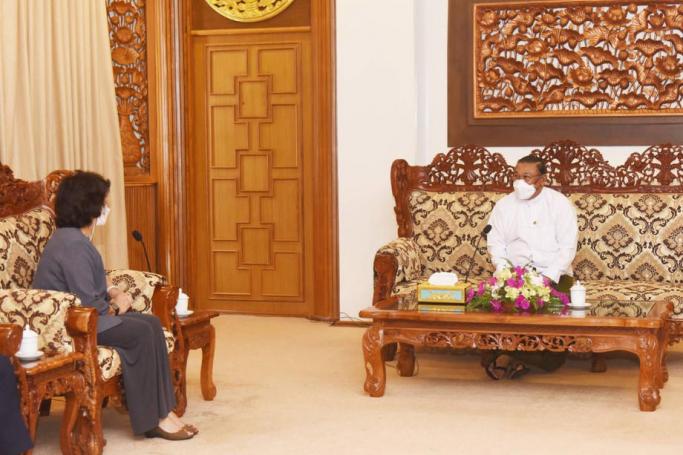The United Nations needs to "review its approach" to solving Myanmar's bloody post-coup crisis, the junta's foreign minister told the world body's special envoy during her first visit to the country on Wednesday.
Myanmar has been embroiled in turmoil since the military seized power in February last year, prompting fierce resistance and violence across swathes of the country.
Diplomatic efforts to resolve the crisis led by the UN and the Association of Southeast Asian Nations regional bloc have made little headway, with the generals refusing to engage with opponents.
In his meeting with UN envoy Noeleen Heyzer on Wednesday the junta's foreign affairs minister called on the world body to "constructively and pragmatically review its approach in its cooperation with Myanmar", the foreign ministry said.
Heyzer also met with junta chief Min Aung Hlaing and called for an immediate end to violence and the release of all political prisoners, her office said in a statement.
It said she had raised a request to meet ousted civilian leader Aung San Suu Kyi, who has been detained since the military's coup and on Monday received another prison term in a secretive junta court.
More than 2,200 people have been killed and more than 15,000 arrested in the military's crackdown on dissent since last February, according to a local rights group.
Suu Kyi faces decades in prison if convicted on a clutch of charges in the junta court.
Hit by western sanctions and isolated on the world stage, the junta has previously accused the UN of interfering in its internal affairs.
Last month the junta triggered renewed international condemnation when it executed Phyo Zeya Thaw, a former lawmaker from Suu Kyi's National League for Democracy party, for offences under anti-terrorism laws.
- Execution moratorium –
Heyzer's office said she had "directly urged" junta chief Min Aung Hlaing "to impose a moratorium on all future executions".
It also said she had conveyed a request from Australia's government for the junta to free detained Australian economist Sean Turnell, who is on trial accused of breaching the country's official secrets act.
Singaporean sociologist Heyzer was appointed by UN Secretary-General Antonio Guterres last year, replacing Swiss diplomat Christine Schraner Burgener.
Schraner Burgener had called for the UN to take "very strong measures" against the military and was the target of regular broadsides in Myanmar's state-backed media.
Military leaders blocked her from visiting the country, where she had hoped to meet with Suu Kyi.
In December, state media reported the junta had closed her Myanmar office, saying her work in Myanmar had "concluded".
There have been no reports in state media about whether Heyzer will be allowed to open an office in the country.
Rights groups said they had little optimism her visit would persuade the military to end its bloody crackdown and engage in dialogue with opponents of its coup.
"UN envoys have visited when the military told them to, stayed where the military told them to, met who the military arranged for them to meet and then left when the military told them to," tweeted Mark Farmaner, director of Burma Campaign UK, a London-based rights group.
AFP












